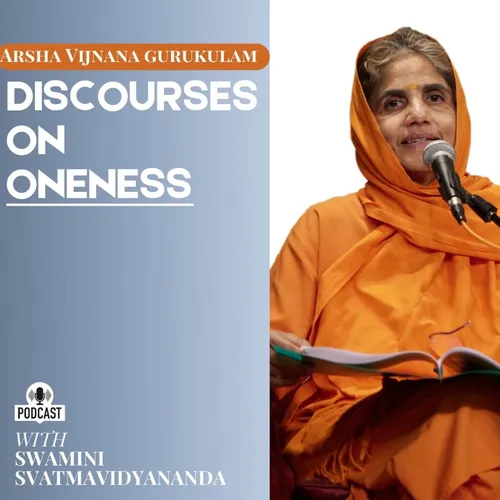
Arsha Vijnana Gurukulam
The Sri Rudram is one of the holiest chants in the Veda. It expounds a sophisticated understanding of God, Īśvara as immanent and transcendental . All that is here in the universe is non-separate from its cause —Īśvara. Everything that is present and everything that comes to light borrows its presence and sentience from Īśvara. The air that we breathe, the sun that lights up the sky, the cool light of the moon, are all manifestations of Īśvara. The entire universe is nothing but Īśvara, but Īśvara, being limitless is not any one thing in universe. Understanding Īśvara in this manner, it is easy to see that Īśvara pervades everything including one’s own body-mind-sense complex. One is never away from Īśvara —in fact, one is Īśvara. Listening to this meaning of this hymn reduces and eliminates the sense of alienation and disconnection that one feels from the Universe, from one’s fellow-beings, and from Īśvara. This oneness is the essence of the vision of Vedanta, gaining which one is free from saṃsāra manifest as sorrow and fear.
- Update frequency
- every 2 days
- Average duration
- 57 minutes
- Episodes
- 266
- Years Active
- 2022 - 2025

Chandogyopanishad 7- 2
In this episode, Swaminiji expounds in detail the meaning behind the two Shanti mantras associated with this upanishad. We are then introduced to Narada, who despite being erudite in the shastras see…

Chandogyopanishad Intro 7-1
Listen to this 10 part episode from Chandogya Upanishad chapter 7, where Swaminiji explains the meaning of Shokam Taratyatmavit.
Narada says to Sanatkumāra ‘True, I have learned much, but I know on…

2024 blessings from Swaminiji
Listen to Swamini's New Years blessings for everyone.

Sādhana-Catuṣṭayam (Samādhānam)
The final qualification in the six pack of Samadi Shatka Sampatti is Samādhānam, which is the other component of Śrāddha.

Sādhana-Catuṣṭayam (Śrāddha)
Why is Śrāddha one of the most important qualification without which self knowledge cannot be gained? Listen to find out!

Sādhana-Catuṣṭayam (Uparama & Titiksha)
Uparama and Titiksha, the next qualifications in the six pack of Samadi Shatka Sampatti is explained in this episode.

Sādhana-Catuṣṭayam (Dama)
Dama, the second qualification in the six pack of Samadi Shatka Sampatti is explained beautifully as being appropriate responses in different situations.

Sādhana-Catuṣṭayam (Śama)
The third qualification called Samadi Shatka Sampatti is a pack of six qualifications, the first qualification Śama is explained in this episode.

Sādhana-Catuṣṭayam (Mumukṣutvam)
In this episode, Swaminiji expounds on one of the most important qualification Mumukṣutvam- a desire for freedom from saṃsāra, for the study of Vedanta Shastra.

Sādhana-Catuṣṭayam (Vairāgya)
Continuing with the fourfold qualification, sādhana-catuṣṭayam required for gaining self-knowledge, this episode expounds on the meaning and importance of vairāgya.

Sādhana-Catuṣṭayam (Vivēka)
In this series Swaminiji will be expounding on the fourfold qualification, sādhana-catuṣṭayam required for gaining self-knowledge. This episode talks about the need for Vivēka - discernment between w…

Dakshinamurthy Stotram 14
This last verse is the phala sruti. It has been made clear that Lord Dakshinamurti is the truth of everything, the manifested and the manifest is one and the same and this takes a form of Sarvātmābhā…

Dakshinamurthy Stotram 13

Dakshinamurthy Stotram 12
The teaching pedagogy of anvayavyatireka, invariable concomitance is talked about in verse 7. The invariable being the constant, unchanging aham, 'I' alone which makes all the variables come to light…

Dakshinamurthy Stotram 11
This knowledge in the form of Lord Dakṣiṇāmūrti frees one from all limiting and disempowering notions and contentions. That light which is all knowledge, that Ātmā cognized in the mind 'as though' co…

Dakshinamurthy Stotram 10
Mantra 4 talks about jñāpti svarūpa, that undifferentiated consciousness which is the indweller of this body-mind -sense complex which obtains as "I", and is Lord Dakṣiṇāmūrti himself. Mantra 5, gets…

Dakshinamurthy Stotram 9
That sphuraṇaṃ, consciousness manifests as the whole world, lending its sentiency to all, making the insentient (asat) appear sentient (sat). To understand this, Swaminiji explains the manifest chait…

Dakshinamurthy Stotram 8
The meaning of Maya Shakti was explained in the previous episode. Continuing, Swaminiji beautifully elucidates why the nature of this Jagat is māyākalpita, akin to a magician conjuring up an elaborat…

Dakshinamurthy Stotram 7
The waking world depends upon the waker. The first two mantras discussed in this episode are mahāpratijñā- encapsulates and sets the ground for what is to come. The first mantra explains the svarūpal…

Dakshinamurthy Stotram 6
As we begin the stotram, one is immediately introduced to the essence of Vedanta. The meaning of viśvaṃ is expounded upon beautifully whereby, the world is shown to be nothing but a product of one's …